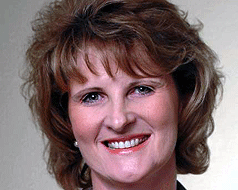
Online PhD in education helps student become teacher
Kaye Shelton already had a successful career in edcuation, but she decided to pursue her online PhD in education, which helped her land a new job as a professor. Find out why she opted to study online and what advice she has for prospective online students.
Kaye Shelton considers herself a true Nebraska Cornhusker — she even flies the University of Nebraska flag from her front porch, much to the chagrin of her neighbors in Beaumont, Texas, which is University of Texas Longhorns country.
However, outside of attending a few football games, Shelton hasn’t spent much time on the campus of the venerable university in Lincoln, Neb. Instead, Shelton earned an online PhD in education and leadership from Nebraska, a career move that helped her land her current job as associate professor of education leadership, doctoral studies, at Lamar University in Beaumont. Prior to that she worked as a dean of online education at Dallas Baptist University, where she developed a quality scorecard for online educational program.
Shelton says she started her PhD program at the University of North Texas in Denton, but after driving an hour and fighting traffic, she was completely stressed out and frustrated by time she eventually arrived at class. She switched mid-stream and enrolled in the online PhD in education and leadership program offered by the University of Nebraska.
Q: In addition to avoiding the commute, what made you decide to pursue an online PhD in education? Did you have other options?
A: I did my master’s in online teaching and learning at California State University-Hayward. I am a mother of three boys, and I was working 50 hours a week — there was no way I could have gone to brick-and-mortar campus.
Q: What were the challenges of studying your field online? How did you overcome them?
A: When doing a project for the classes, you do not get to sit face-to-face with your instructors, but you can overcome that with Skype or WebEx or other programs. Also, I worked with professors that were keenly interested in me and in my success. I never felt like a distance learning student, and I was never treated any differently.
Q: What were the main benefits of earning a PhD online? Are there benefits inherent in your online program not found in other avenues of study?
A: It helped me to experience being an online student; I could identify and help improve my programs and also feel the frustration of the students. Another benefit was working under some of the most respected faculty in the country in education research.
Q: How did your interactions with professors and other students work through online study? What method worked best?
A: We used a coursework management system, Blackboard. You need to have a good Internet connection; dial up wouldn’t have been a good option. It is also important for a student to be comfortable with a computer and the technical skills needed. You don’t have to be an expert, but you need to be comfortable and to expect technology to fail sometimes and be comfortable with that.
Q: Were there professional or job placement resources available to you in your program? How did they help you advance your career?
A: I already had a job [as dean of online education at Dallas Baptist], but my husband relocated and now I am an associate professor of education leadership, doctoral studies, at Lamar University in Beaumont. I teach doctoral-level classes and chair students working on their dissertations. I teach on campus and online, and I literally am starting to do the same thing that I had to do at Nebraska.
Q: Any advice for students considering an online PhD in education?
A: Make sure the institution is regionally accredited, and try to talk to other students to find out about their experience. Google the university’s name. You definitely need to not just click on first web link that you find and go to school there. You need to do your research. There were a lot of online programs for me to look at, but the one I chose was the most prestigious and the best for value.
Also, make sure there is a process in place for faculty to work with you to complete the dissertation process. Make sure you are guaranteed interaction with faculty members.
Q: With your PhD in education and leadership in hand, how have your career prospects increased?
A: Consulting opportunities have really opened up — I literally am having to turn opportunities down. It certainly made it easier to find my current faculty position. I was well established as a dean, but having a PhD certainly helped my position as a doctoral professor at Lamar. I wouldn’t even have been considered if I didn’t have it.
